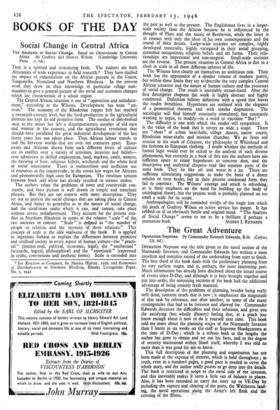BOOKS OF THE DAY
Social Change in Central Africa
The Analysis 01 Sochi' Change. Based on Observations in Central Africa By Godfrey and Monica Wilson. (Cambridge University Press. is. 6d.)
THIS is a spirited and stimulating book. The authors are both Africanists of wide experience in field research.* They have studied the impact of industrialism on the African peasant in the Union, Tanganyika, Nyasaland and Northern Rhodesia. In the present work they draw on their knowledge of particular village com- munities to give a general picture of the social and economic changes which are characteristic of a whole region.
The Central African situation is one of "opposition and maladjust- ment," according to the Wilsons. Development has been "un- even." The economy of the Rhodesian copper belt has reached a twentieth-century level, but the food-production in the agricultural districts has kept its old primitive form. The exodus of able-bodied men to the mines has left a disproportionate number of old men and women in the country, and the agricultural revolution that should have paralleled the great industrial development of the last thirty years has not taken place. Thus African labour travels to and fro between worlds that are over ten centuries apart. Euro- peans and Africans drawn from such different levels of culture are in conflict over a variety of activities, interests and beliefs— over admission to skilled employment, land, markets, cattle, women, the brewing of beer, religious beliefs, witchcraft and the whole field of social intercourse. There is malnutrition and inefficient use of resources in the countryside ; in the towns low wages for Africans and phenomenally high ones for Europeans. The resultant tension between black and white has already resulted in serious strikes.
The authors relate the problems of town and countryside con- stantly, and their picture is well drawn in simple and trenchant phrases. But they are not content with mere description. They set out to analyse the social changes that are taking place in Central Africa, and hence to generalise as to the nature of social change, and the concltions under which it can, and cannot, take place without severe maladjustment. They account for the present con- flict in Northern Rhodesia in terms of the relative " scale " of the two societies in contact. " Scale " is defined as "the nurnber of people in relation, and the intensity of these relations." This concept of scale is the idge maitresse of the book. It is applied in ingenious fashion to explain the differences between primitive and civilised society in every aspect of human culture—the "practi- cal " (institut onal, political, economic, legal), the " intellectual " (scientific, logical, philosophical) and the "emotional" (expressed in crafts, conventions and aesthetic forms). Scale is extended into * See Reaction to Conquest, by Monica Hunter, 1936, and Economics of Detribalisation in Northern Rhodesia, Rhodes Livingstone Paper,
No. 5, 1941.
the past as well as the present. The Englishman lives in a larger- scale society than the African because he is influenced by the thought of Plato and the music of Beethoven, while the latter is in contact with only the ideas of, his own contemporaries and the sound of their drums. Large-scale societies are complex, highly developed materially, highly variegated in their social grouping, economic occupations, religious beliefs and art forms. Their rela- tionships are impersonal and non-magical. Small-scale societies are the reverse. The present situation in Central Africa is due to a clash in scale in all these different spheres of life.
The Wilsons have clearly set themselves an ambitious task. Their book has the appearance of a slender volume of modern poetry, but within these limits they try to-describe the very complex Central African situation and the nature of human culture and the processes of social change. The result is inevitably stream-lined. After the first descriptive chapters the work is highly abstract and highly condensed. Definition follows definition with a speed that leaves the reader breathless. Hypotheses are outlined with the elegance of a geometrical theorem and with similar dogmatism. The sociologist will find himself constantly stimulated, but constantly wanting to argue, to modify—in a word to ejaculate "But! "
The difficulty is one with which the reader will sympathise. It is the value of the book that it covers so wide a scope. There are " shots " of urban beer-halls, village dances, native courts, Rhodesian mine-shafts and mission churches. We go from soil erosion to the work of Cezanne, the philosophy of Whitehead and the fashions in European clothing. I doubt whether the methods of formal logic would ever be suited to the analysis of such diverse phenomena, but certainly in a book of this size the authors have not sufficient space to relate hypotheses to concrete data, and the descriptive and analytical chapters read like separate parts of the same book. They lie like oil and water in a jar. There are sufficient stimulating suggestions to make the basis of a dozen articles or even books, but in their present condensed form they fail to convince. The Wilsons' courage and attack is refreshing, as is their emphasis on the need for building up the body of sociological theory, but the present work is probably planned on too small a scale for its scope.
Anthropologists will be reminded vividly of the tragic loss which the death of Godfrey Wilson on active service has meant. It has robbed us of an obviously fertile and original mind. "The Analysis of Social Change" seems to me to be a brilliant if perhaps a


























 Previous page
Previous page